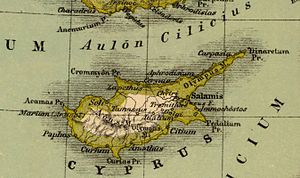Battle of Salamis (306 BC)
| Battle of Salamis | |||||||
|---|---|---|---|---|---|---|---|
| Part of the Wars of the Diadochi | |||||||
 Map of ancient Cyprus |
|||||||
|
|||||||
| Belligerents | |||||||
|
Antigonids Athens |
Ptolemaic dynasty | ||||||
| Commanders and leaders | |||||||
|
Demetrius Poliorcetes Medius of Larissa |
Ptolemy Menelaus (POW) |
||||||
| Strength | |||||||
| c. 180 warships (30 Athenian) | 60 warships (Menelaus) 140 warships & 200 transports (Ptolemy) |
||||||
| Casualties and losses | |||||||
| 20 warships damaged | 80 warships lost 40 warships and 100 transports captured Menelaus' force surrenders |
||||||
The naval Battle of Salamis in 306 BC took place near Salamis, Cyprus between the fleets of Ptolemy I of Egypt and Antigonus I Monophthalmus, two of the Diadochi, the generals who, after the death of Alexander the Great, fought each other for control of his empire. Antigonus' fleet was led by his son Demetrius, who had invaded Cyprus and was besieging Ptolemy's brother Menelaus at Salamis. The battle was a complete victory for Demetrius, and resulted in the surrender of Menelaus and his capture of Cyprus. As a result, Antigonus assumed the royal title that had been vacant since the murder of Alexander's underage son, followed by the other Diadochi soon after.
During the wars of the Diadochi that followed the death of Alexander the Great, Ptolemy, who had seized control of Egypt, had taken over the island of Cyprus and used it as a base of operations against his rival Antigonus I Monophthalmus. From Cyprus, Ptolemy's forces were able to raid the coasts of Syria and Asia Minor. In early 306 BC, Antigonus resolved to remove this threat, and ordered his son, Demetrius, to capture the island. Demetrius at the time was in Greece, where he had in the previous year overthrown the garrison installed in Athens by the ruler of Macedon, Cassander. The city, along with neighbouring Megara, was restored to democratic rule, and allied itself with Demetrius. As a result, when Demetrius sailed from Athens in spring 306 to capture Cyprus, he was accompanied by 30 Athenian quadriremes.
...
Wikipedia
